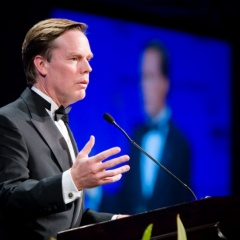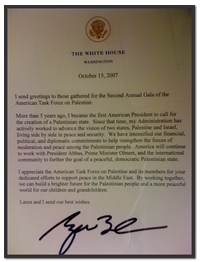<< Back:Isaacson Remarks | Home | Next:>>
I want to thank, Ziad Asali, and the American Task Force on Palestine for your leadership. Thank you for your support for our efforts to achieve a lasting peace between Israelis and Palestinians and to see the establishment, at long last, of an independent Palestinian State. You have truly been a voice for moderation and peace.
I am honored to be here with such a distinguished assemblage. I want to give special thanks to Senators Carl Levin, Chuck Hagel, and John Sununu and to all the members of the U.S. Congress that are here today. They play an essential role in our democracy and in our foreign policy. I am especially delighted to see so many members of our diplomatic core, especially those from the Middle East.
Most importantly, I wish to congratulate my former colleague Ambassador Ted Kattouf, Mr. Farouk Shami, and Dr. Theodore Baramki for their awards tonight. Your achievements in government, medicine and commerce and industry are a reflection of the great contributions made by Palestinian-Americans to this country.
I am very honored to be here with you this evening. And I want you to know how much respect I have for the Palestinian-American community in America. My sister-in-law, Nayla Baha, is a Palestinian-American. Her story and that of her family is very representative of what all of your families have experience. Her mother and father fled Jaffa in May, 1948, thinking they would return in a few days or weeks. But, instead, the cruel fate of history determined that they would be refugees for more than forty years. First in Libya, then in Beirut, then in Athens and finally in America where they have found a home and where they are citizens. From my ties to Nayla’s family, I have learned that Palestinians, like all people, yearn for security and stability and freedom. I have learned that they have an extraordinary devotion to their families, and education, and most especially, to peace.
I saw that first hand twenty years ago when I lived in East Jerusalem. As a young Foreign Service Officer, I served at our Consulate General in Jerusalem. My job was to coordinate US economic and humanitarian assistance for the Palestinian people. Having lived and worked intimately with them, I know how hard working, dedicated and committed Palestinians are to improving their communities and working to create a better future for their children. I’ve seen their passion, their talent and their work-ethic first-hand. I have also seen and lived the real beauty of the West Bank olive groves and vineyards and of the historic cities that dot the landscape – Nablus, Jenin, Tulkarem, Jericho, Ramallah, Bethlehem (which Secretary Rice visited today) and Hebron.
Secretary Rice has spent this week in Jerusalem, Ramallah and Bethlehem. President Bush and Secretary Rice have outlined a clear goal – a Palestinian state living side-by-side with Israel. It’s reaching that goal that will take a lot of work. The situation last year seemed grim and progress towards peace seemed far in the distant future. The war in Lebanon had just ended and the Israeli government was focused on the implications of their confrontation with Hezbollah; Hamas’ ineffective governance was becoming more and more evident; and inter-Palestinian factional violence seemed almost a daily occurrence.
Before this same audience last year, Secretary Rice outlined our plans to begin laying the political and economic foundations of a successful Palestine. When most people saw closed doors, she saw opportunity and pushed forward. Because of the President’s and the Secretary’s personal engagement, much has change since the last American Task Force on Palestine dinner.
We now have a Palestinian government that, I believe, is a real partner for peace and truly has the interests of the Palestinian people in mind. I visited Ramallah in August to meet with Prime Minister Salam Fayyad. He is an impressive man and very accomplished. In Ramallah, I saw the promise of self-government and a future state. And I also saw the obstacles of illegal outposts and roadblocks and the extraordinarily difficult conditions of life for average Palestinians.
The United States strongly supports President Abbas, Prime Minister Fayyad and all those who have demonstrated their sincere desire for peace, reconciliation and a bright future for Palestine.
On July 16, President Bush underscored his support of President Abbas and Prime Minister Fayyad and reiterated his commitment to the Palestinian people and vision of a two-state solution and the creation of a Palestinian state. We view the creation of a Palestinian state to be not only in the interest of Palestinians, Israelis, and their neighbors, but also as a key American interest.
In order to achieve this goal, our priorities are three-fold: to support progress on political talks between President Abbas and Israeli Prime Minister Olmert; to assist with Palestinian capacity and institution building; and to encourage tangible improvements on the ground.
Secretary Rice’s near-monthly travel to the region underscores our commitment to seeing progress on the bilateral discussions between Prime Minister Olmert and President Abbas, and her efforts have not been in vain. The two leaders have met five times since June, and recently formed teams to work on a joint statement that could lay the foundation for serious negotiations on difficult issues.
The international meeting the U.S. is hosting later this autumn in Annapolis, Maryland aims to support the political process and rally international support for the efforts of the Palestinians and Israelis, for which there is a good deal of momentum. President Bush has made this one of the highest priorities of his Administration. In a recent interview with Al Arabiya, President Bush said that this meeting will be serious and substantive; that the aim of this meeting is to advance the cause of the establishment of a Palestinian state. Secretary Rice, as we speak, is in Jerusalem. She spent nearly four days in the region – and that’s a long time in diplomatic terms, believe me.
The parties have their differences, of course, and we are supporting their efforts to address the concerns they have. Ultimately, however, we must take note of the fact that there has to be a comprehensive peace in the Middle East, beginning with the creation of an independent, viable Palestine. We are absolutely serious about moving this issue forward.
The framework for discussions at the Annapolis meeting will be consistent with the Roadmap, and based on the principle of land for peace, United Nations Security Council Resolutions 242, 338, and 1397, and the Arab League Peace Initiative. Key participants will be the Israelis and Palestinians, of course, but we also view the Quartet and the Arab League Follow-Up Committee as natural participants as regional support is key to success, and essential for a comprehensive Middle East peace. The presence of Arab diplomats and dignitaries here today underscores the regional commitment to peace. We view this meeting not as an end in and of itself, but rather the beginning of a process.
The planned international meeting will also aim to advance efforts of Tony Blair on Palestinian economic and institutional capacity building. For the past decade, Mr. Blair has been at the forefront of international efforts to promote peace and reconciliation around the world. He is a renowned statesman, respected and listened to by the international community, and will bring tremendous dedication to the task of coordinating international efforts to help the Palestinians establish the institutions of a strong and lasting free society– including effective governing structures, a sound financial system, and the rule of law. Both Israel and the Palestinian Authority have welcomed his appointment.
The United States’ commitment to the Palestinian people remains strong. This year alone, we will provide $144 million in food assistance, education, health, and social services for Palestinians registered with the United Nations Relief and Works Agency in the West Bank and Gaza, Jordan, Lebanon, and Syria. We will provide $50 million in assistance for Palestinian basic human needs, democracy and civil society, and private sector development through United States Agency for International Development – all of this is in addition to nearly $130 million in ongoing USAID programs.
On July 10, the President authorized the Overseas Private Investment Corporation to support a program that will help generate $228 million in lending to Palestinian small and medium enterprises. We are working with American business to set up partnerships in the Palestinian territories, because we know that a vibrant private sector is the key to a vibrant economy.
Also, as Walter Isaacson has mentioned, Secretary Rice is asking the American private sector to promote economic and business opportunities for Palestinians. This is one area in which the Palestinian- and Arab-American community can really make a difference.
Of course, we applaud Ziad for establishing the American Charities for Palestine. This initiative will harness and unleash the generosity of the Palestinian-American community to improve the lives of the Palestinian people. By channeling greatly needed assistance to promising projects in the West Bank, American Charities for Palestine will support important work already being done on the ground by the United States Agency for International Development and the State Department. I encourage each and every one of you here tonight to evaluate what you can do and how you can help.
Finally, we continue to encourage both Israel and the Palestinians to meet their obligations under the Roadmap. There is no alternative to progress on the ground. Israel should halt settlement expansion, remove unauthorized outposts, and reduce its footprint in the West Bank. I know the Israelis are serious about peace, but it is important that the Palestinian people know and see that as well.
The Palestinians have to seriously undertake reforms to show that they can govern themselves and to set up the necessary institutions of their future state. They have to work harder to combat terror and extremism in their communities to prove that a Palestinian state can thrive peacefully alongside its neighbors.
The past year in Palestinian and Israeli history has been a difficult one. As Secretary Rice said on her most recent trip to the region: “We've come quite a long way and we've got quite a long way to go – but we're not going to tire until we have given it our last ounce of energy and my last moment in office.”
We all have a duty to help clarify the way forward and get involved. By supporting the reforms of President Abbas and Prime Minister Fayyad, we can all help show the world what a Palestinian state will look like and act like, showing that a Palestinian state can be a partner for peace and prosperity in the world.
And as Secretary Rice said this week, “the time for a Palestinian state is now.”
Before I leave you, I have a letter to read to you from President Bush:
“I send greetings to those gathered for the Second Annual Gala of the American Task Force on Palestine.
More than 5 years ago, I became the first American President to call for the creation of a Palestinian state. Since that time, my Administration has actively worked to advance the vision of two states, Palestine and Israel, living side by side in peace and security. We have intensified our financial, political, and diplomatic commitments to help strengthen the forces of moderation and peace among the Palestinian people. America will continue to work with President Abbas, Prime Minister Olmert, and the international community to further the goal of a peaceful, democratic Palestinian state.
I appreciate the American Task Force on Palestine and its members for your dedicated efforts to support peace in the Middle East. By working together, we can build a brighter future for the Palestinian people and a more peaceful world for our children and grandchildren.
Laura and I send our best wishes.
George W. Bush.”
Thank you.
<< Back:Isaacson Remarks | Home | Next:>>
TAGS:




















